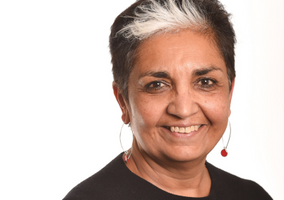Earlier this year, when Oxfam updated its inclusive language guide to reflect new social norms and the experiences of the people it is trying to support, it was met with a predictable wave of outrage and allegations of “wokery”. Less predictable was the measured, calm, yet unrepentant, response of the charity’s CEO Danny Sriskandarajah who stood by and passionately defended the decision. It left his critics looking petty and mean-minded.
Fear of upsetting stakeholders, reputational risk and of stepping outside our clearly defined purpose can often leave charity leaders reluctant to put their heads above the parapet, especially on topics that stray from the core activities of the charity they lead. This is understandable in what is an increasingly hostile political environment for charities, with polarising culture wars and an unforgiving social media. But in this case, Oxfam, under Danny’s leadership, stood its ground, knew what was right, and defended it.
And he is not alone. RNLI has taken its strong stance on the migrant boat crisis in the Channel and has seen its support soar, while Freedom from Torture’s Stop the Flights campaign saw success as its activism left government without planes for its Rwanda plan. Two other organisations, considered by many to be national institutions, also faced down a barrage of criticism to do what they believed was right – the Women’s Institute for its inclusive stance on admitting transgender women and the National Trust’s decision to shine a light on its sites’ connections to colonialism and slavery.
The vital role of charities in society
When charities take a bold stand, it has clear benefits, most importantly it delivers on their purpose, delivering change for and advocating on behalf of their beneficiaries. But it also raises their profile, the profile of their CEO, and strengthens the public’s understanding of what the charity stands for and its values. And the benefits are wider than that - it raises the profile of the whole sector and reminds the public and policy makers of the vital role we play in society. The aim of any social charity should be to make itself redundant so that the whole of society takes responsibility for problems which have previously been seen as a minority issue or someone else’s problem.
As CEO of the RSPCA, I recognise the benefits of being more than “just” an animal charity. We are not just helping animals, we help people to help animals and many of the people we engage with are vulnerable. Through our farm animal work, we advocate not only for better welfare but a fairer and more resilient food system. Through our work to ultimately end the use of animals in science, we embrace technological innovation. And we are campaigning to restore nature so wild animals can flourish again.
We are also making our contribution to creating the “good society”, one which is fairer, inclusive and more compassionate, one where animals and people don’t get left behind. And we are not alone, the charity sector as a whole is at the forefront of delivering the “good society” – we are all making our individual, unique contribution.
Therefore, it is vital that charity leaders seize the mandate to speak out and should feel empowered to speak beyond their brief, given the collective role we are playing in creating a kinder and more compassionate society. Charity CEOs have a crucial role to play as thought leaders, drawing on our experience and the insights from our organisations.
The role of trustee boards
Next year marks the RSPCA’s 200th birthday. Back in 1824, our founders were inspired by the idea of “social consciousness” – considering the impact we as humans can individually and collectively have on people, the planet and animals. And it’s important we continue this tradition. We need to stretch and challenge what our charities stand for. We know that animal welfare is tightly bound up in the future of ourselves and the planet – there is no animal justice without social justice and climate justice. So we absolutely cannot talk about better animal welfare without speaking up for a better world for all.
Boards have got a critical role to play in this. Charities have to stay true to purpose, but boards should seize the opportunity to take a broader view of that purpose, supporting CEOs to speak more widely on issues that affect our society. This is more important now than ever, with increasingly polarised discourse and the impact of the cost-of-living crisis coming straight after the global pandemic.
This can make boards nervous – a single tweet can lead to screaming headlines and even politicians weighing into the debate of whether a charity has stepped outside its role. But this makes it even more important not to be risk averse, because we are speaking out in a more contested public space, where the social issues we care about, that we were set up to challenge, are being politicised. Only by holding our nerve, can we break through the noise.
A benefit to taking risks
The private sector doesn’t seem held back by the same constraints: Ben and Jerry’s ice cream is popping up in people’s social feeds talking about migration and the Ukraine war. They may lose some customers, but they gain a stronger customer base with lasting loyalty. This is where boards need to look outside the sector and see the benefit of taking risks. And we have support to do this – a recent report by the Sheila McKechnie Foundation revealed public and private sector leaders want charity CEOs to speak out on social issues of the day, not just their core issue. It called out the lack of charity representation on key current affairs programmes like Question Time, Peston and the Andrew Marr Show, making up just 2% of guests, compared to 10% from academia and journalism and 4% from business. Charities do not get the profile they deserve.
Admittedly, the third sector has been stung in recent years with outspoken criticism from previous chairs of the Charity Commission and former civil society ministers, essentially telling us to “get back in our box” and not to stray from our core charitable purpose. We have to acknowledge in this debate that charities’ campaigning role is under assault – the CIVICUS Monitor has downgraded the UK’s civic space from “narrowed” to “disrupted” and the Sheila McKechnie Foundation’s campaigner survey for 2022 revealed 70% of campaigners say that politicians have become more hostile to campaigning in the past year. But it is possible – and essential – to be bold as long as you stay true to your organisation’s values and avoid being party political.
The RSPCA has been campaigning since it was formed in 1824, it is our history and it is what we do and who we are – and the same is true for charities more broadly, as a sector, we shine a light on unmet or poorly met needs in our society. We cannot and should not shy away from doing that. We have been under intense scrutiny and it can seem safer to keep firmly out of the firing line. But we cannot let a minority of – albeit loud – voices, put us off. Like Oxfam, we must hold our nerve and advocate for our cause. And our boards must get behind us. Our society needs us to do this.
Related Articles












